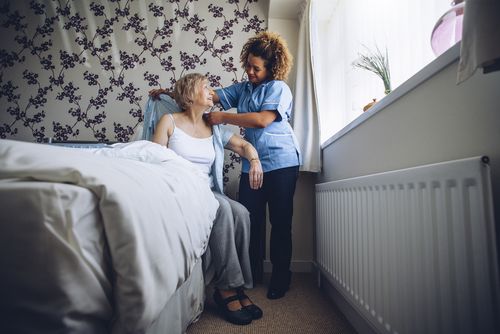People with dementia often have problems getting a good night’s sleep. Scientists don’t really know the connection between dementia and sleep problems. They can only assume it has to do with the changes these diseases cause to the brain.
Like many other symptoms of dementia, those affecting sleep vary from one person to the next. Some experience more intense feelings of confusion and anxiety during the latter part of the day. Feelings of agitation prevent them from being able to sleep. Sometimes they get up and wander during the night. Others start to feel sleepy during the day and become restless at night. These symptoms of late-day confusion are called “Sundowning” in Alzheimer’s patients.
Changes in sleep patterns often lead to an increase in behavioral issues as well. Both factors add to the challenges family caregivers face in providing care to their loved one. Often, the caregiver ends up losing sleep as well.
Common Sleep Problems with Aging
It isn’t unusual for anyone to develop changes in how they sleep as they grow older. A shift in the circadian rhythm causes sleep patterns to change. Seniors begin to sleep at different times of the day and in shorter intervals. These fragmented sleep patterns prevent them from achieving a deep level of sleep that makes them feel rested. Sleeping lighter also means waking up easier throughout the night. Seniors often wake up earlier, getting fewer hours of sleep than they did earlier in life. These normal changes in sleep patterns often occur due to symptoms of underlying medical conditions.
Underlying Medical Conditions
Medical conditions including arthritis, heart and lung conditions, reflux disease, and urinary conditions are common in seniors. Symptoms from any of these conditions can interfere with sleep. Pain, anxiety, depression, and side-effects of medications or alcohol can also be to blame. Seniors also have an increased incidence of sleep apnea, breathing disorders, and restless leg syndrome. Any of these causes of sleep problems can contribute to sleep disturbances in dementia patients.
The Added Complications of Dementia and Sleep
For most patients, sleep disorders are ‘multifactorial’ meaning that there are multiple issues causing their sleep disturbances. In addition to the underlying medical conditions, fatigue, depression, anxiety, or confusion caused by dementia can make it difficult. For example, a loss of light and increased shadows in the evening can cause confusion and fear. The way that dementia affects the brain causes them to see things much differently than someone without dementia.
Since the cause of sleep issues and dementia problems is multifactorial, you need to take a multifactorial approach to treatment as well. Start by working with their doctor to pinpoint as many underlying causes as possible. Describe the types of problems the person is experiencing. Do they have trouble going to sleep, wake up frequently, or wander during the night? Do they often nap during the day, doze off randomly, or snore loudly? Write down a complete description of their issues including the times they normally go to bed and get up.
The more information you can provide to the doctor, the more accurately he/she can diagnose the underlying conditions. They will also consider whether any current medications might be adding to the problem. Never assume that dementia is the primary cause of the sleep disturbances and that there is nothing you can do to improve the situation.
Advice for Caregivers
Everyone needs quality sleep to stay healthy, alert, and functional during the day. Caregivers are especially vulnerable to the effects of dementia and sleep deprivation. Caring for an Alzheimer’s patient with sleep deprivation extends your day. It also depletes your energy and your ability to provide top quality care.
One of the first things to do to improve your loved one’s sleep is to treat any secondary conditions adding to the problem. Even though the dementia is the major cause of the problem, there are some things you can do to help.
- Keep the Home Well Lit – Once the sun sets and the light begins to fade, make sure there’s plenty of light in the home. This reduces the shadows and keeps the home from feeling unfamiliar to the person.
- Invest in An Alarm – A bed alarm alerts the caregiver when the patient tries to get out of bed. This allows you to have peace of mind while you get rest without worrying that the patient will get hurt or leave the home.
- Get Into a Routine – Get them up and into bed at the same time every day. Discourage them from watching TV when they wake at night to avoid stimulation. Getting into a routine will help them go to sleep at night without waking soon after.
- Encourage More Activities Throughout the Day – The last thing you want them to do is to get their rest during the day. Instead, find activities that keep them moving during the day so they’ll be ready to sleep once bedtime rolls around. Physical and mental exercise is good for them. Just make sure you slack off at least four hours before bedtime.
- Feed Them a Healthy Diet – Eating healthy is one of the best things anyone can do for their physical and mental health. Make sure they get the nutrition they need without stimulants like caffeine and nicotine.
- Talk to a Doctor or Nutritionist – If you aren’t sure which types of foods are best for dementia patients, a nutritionist can help you plan a healthy menu. If your attempts at improving their sleep patterns don’t work, the doctor can make additional suggestions. They understand how dementia and sleep disturbances can impact the person’s life. Most will recommend other changes before prescribing any medications.
- Consider Putting Them Into an Assisted Living Facility – Being a primary caregiver for a dementia patient is very demanding. Once it gets to the point where you aren’t getting the rest you need, it impacts your well-being and theirs. An assisted living facility gives your loved one the advantage of a full staff to provide their care. One that specializes in dementia care also helps give them the physical and emotional support they need at every stage of the disease.
Contact Lakeside Manor to schedule a tour of our assisted living facility today. Meet our team and learn more about the quality of dementia care we can provide to your loved one on a daily basis.


